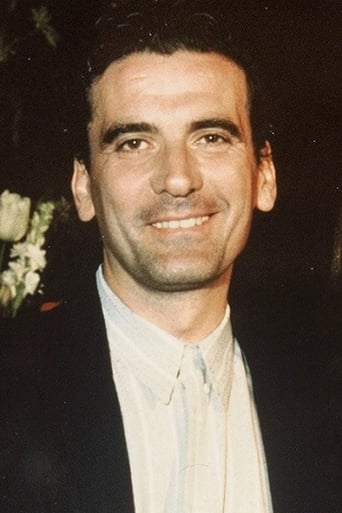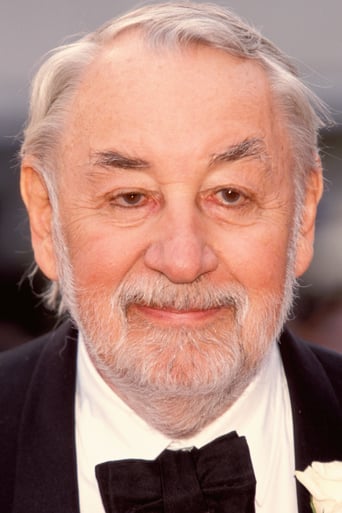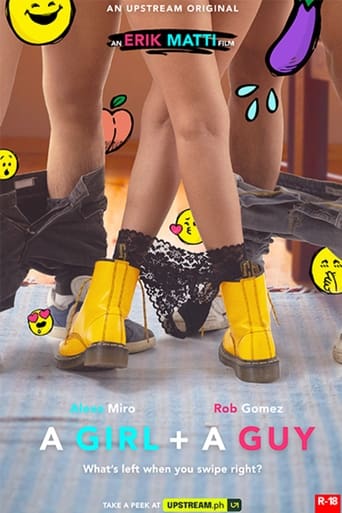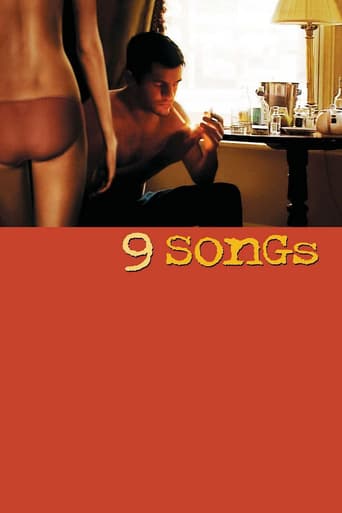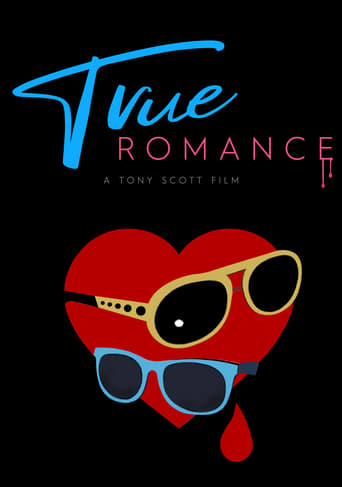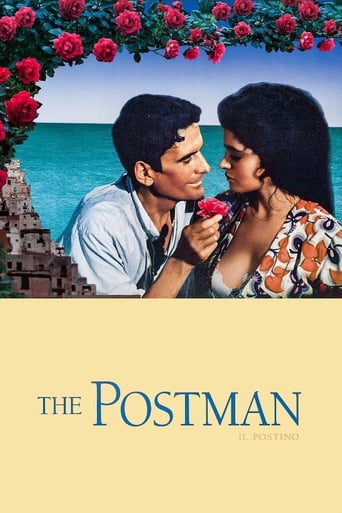
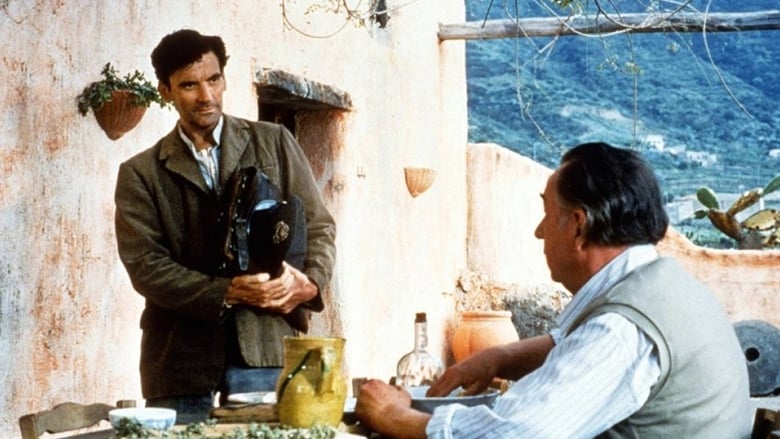
The Postman (1995)
Simple Italian postman learns to love poetry while delivering mail to a famous poet; he uses this to woo local beauty Beatrice.
Watch Trailer
Cast
Similar titles

Reviews
Wonderful character development!
It's entirely possible that sending the audience out feeling lousy was intentional
This is a must-see and one of the best documentaries - and films - of this year.
Excellent and certainly provocative... If nothing else, the film is a real conversation starter.
The subtext of Pablo Neruda's (Philippe Noiret) Communism was brought up a distractingly excessive number of times in the movie, and wasn't even necessary to tell the story, except that it was the reason for Neruda's exile. His romantic views of Communism obviously looked askance at the dehumanizing effect the ideology has which promotes subservience to a governmental authority. There's no poetry in that to my mind, but somehow he got many believers to hear his message. Other than that, this is a gentle story that reveals a developing relationship between Neruda and his dedicated postman Mario Ruoppolo (Massimo Troisi) on an Italian island. I liked the way their friendship evolved over the course of the story, and how Mario came to be a lover of poetry. So much so that he asks for Neruda's help in writing a poem that would win him the heart of a pretty waitress in town. Though it didn't appear that the lovely Beatrice (Maria Grazia Cucinotta) had any other romantic prospects available, I personally didn't quite understand the connection she felt for Mario. Obviously uneducated with a limited grasp of reading and writing, Mario didn't have much to offer Beatrice in the way of comfort and security. However once he proclaimed that her smile spread like a butterfly, she was a goner. I hate to be cynical, but I think it would have taken more than that to close the deal with someone of Beatrice's bearing and Mario's lack of. There's a disturbing sense of closure to the story when it's revealed that Mario died shortly before the birth of his son, with Neruda gone and Beatrice raising their young boy alone. Mario was never able to reconcile with the loss of his friend, who returned to his home country of Chile when an arrest warrant against him was revoked. It's strongly suggested that Mario died at the hands of authorities while protesting his pro-Communist leanings at a demonstration that got out of hand. For such a tragic ending, no metaphors are sufficient.
Simple Italian postman learns to love poetry while delivering mail to a famous poet; he uses this to woo local beauty Beatrice.Some have called this film a "romance between two men", albeit two men who love the ladies. Perhaps it might be better to call it a bromance in today's parlance. But even that is not strictly accurate. In many ways this parallels "Cyrano de Bergerac" or "Roxanne".It was interesting to see Pablo Neruda brought to the big screen. I admit I am not all that familiar with his work, and those who have little interest in poetry probably no him even less. But he is a historical figure that could be interesting in a historical context... thank you to the Italians for bringing this to the world.
The Chilean poet and communist agitator Pablo Neruda may never have set foot on the island of Salina in 1950, but writer-actor Mariamo Troisi's exploration of the idea is probably more interesting than any account of his actual exiles abroad. The eponymous postman of the film, Mario, has never taken to the patrilineal profession of fishing in his family. His widower father understands he never will and releases his seemingly simple son from his duties, to choose an occupation more suited to his abilities. In town, the communist postmaster needs a hand with the flurry of fan mail in the wake of Neruda and his wife's arrival. He greatly admires the Bolivarian bard and has his new postman run reconnaissance and procure signatures from him. Though their early exchanges may be of little significance, the two very different men of letters soon form a bond through a series of exchanges on poetry, love and politics. When Mario first meets barmaid Beatrice Russo over a game of table football, he instantly falls in love. He is inspired by his mentor to write her love poems, many of which he plagiarizes, and soon wins her heart. Michael Radford's surname may seem a little consonant-heavy for a production of this origin but the writer-director's English eye can only be clearly detected in the humour of the pacey, racy table football scene; which a native or continental director may have shot a little more seductively. It is really Troisi who leaves his indelible print on the film, which would be his last (dying tragically the day after production wrapped). The actor's physical frailty comes across as his character's mumbling humility. When beautiful Maria Grazia Cucinotta falls for his charms (or lack thereof), no one would seem more deserving a husband than he, and it is immensely gratifying to see his son Pablito stumble onto screen at the end. Phillipe Noiret also evokes much feeling in the last scene, imagining his friend's great yet fatal agitation for change, while walking their familiar beach. We get the feeling they may have liberated one another.'Il Postino' is very much a film that flows like poetry. There is no solid structure as prescribed by the script doctors of the time. No stakes and little drama. When our lovable protagonist dies at the end, it is not played for tears of devastation. I felt quiet elation: he had finally found his voice and could speak up for his people at the rally. He asks Neruda earlier in the film a question regarding the writer's revolutionary ideals, "So what if we break off our chains? What do we do then?" He obviously has an answer to that question by the end, which is satisfaction enough. In another exchange, when Mario's plagiarism is discovered by Pablo, he counters "Poetry doesn't belong to those who write it; it belongs to those who need it." This strikes one as quite humorous in the context of the scene but when recalled or read alone it signifies the point at which Mario has cast the chains off his mind. Sadly the distributors do not live by this dictum, and intellectual copyright law prevails online and elsewhere.While it may be a fictional account, the film is very much a celebration of the actual effect Neruda's poetry had on many of the working people of the world. Not so much a tribute to him, but to the millions of postini worldwide who have been delivered and a rallying call for all those who have yet to be.
I only heard of this movie on the TV game show 'Who Wants to be a Millionaire?'. The question was which one of 4 mentioned actors starred in the films 'Nuovo Cinema Paradiso' and 'Il Postino'. I hadn't heard of 'Il Postino' before, but I knew that Philippe Noiret stars in 'Nuovo Cinema Paradiso', so I already knew the answer. The presenter recommended the person who wrongly answered the question to watch these 2 movies because something changes inside us once we get to see these 2 films.Then I did research on this motion-picture. It sounded promising, even more so by being foreign. I also got to know the sad story of Massimo Troisi, who played the title's postman (Pablo Neruda's postman). The man suffered from heart disease since a long time ago. He knew about his fragile heart condition and knew he needed treatment, but despite this he wanted to do the movie anyway. He even postponed heart surgery so that he could complete the film. That was a brave move. And he did manage to finish the movie just in time. Only 12 hours after completing the film he died of heart attack. You can say that he gave his life to make this film.Massimo Troisi is great as Mario Ruoppolo, the postman. But it's also sad to see him in this film because we are looking at a man who was dying while making it and that he died almost immediately after completing it.Phillipe Noiret is great as the chilean poet Pablo Neruda. While Pablo Neruda existed for real, his friendship with the postman didn't. But I don't know if a postman named Mario Ruoppolo existed in real life or not and if he was Pablo Neruda's postman or not.The film's got beautiful cinematography and soundtrack, which gives it more emotion and beauty. The plot is, in concept, good. But the movie itself lacks something (perhaps more emotion is one of those things it lacks) and is even a little too-slow paced. It's not a bad movie. It's interesting, moving, pretty to view... a good attempt, just not quite top material. It just isn't as great as it reputation suggests (with, of course, all due respect in memory of our friend Massimo Troisi).
